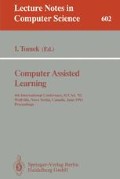Abstract
“PENELOPS 2” — Produit d'ENseignement de l'ELectronique Opérant Par Simulation — is a new aid for the teaching of Electronics by computer simulation. It is in the process of being developed by the DRUID laboratory — Développements et Recherche sur les Utilisations de l'Informatique en Didactique — of the University Paris 7 and the Electronics Department of the University Paris 6.
It is intended for students up to and including the M.A. level.
It deals in an original way with the functioning of electrical capacitors which have either a vacuum or an isothermal isotropic homogeneous dielectric insulator.
It explains clearly:
-
the phenomena that produce the charges on the plates
-
how the capacitor “cats” the direct current component of the signals and allows the alternative current component “to pass”.
It analyses the principal uses of the capacitor:
-
uncoupling of the circuits
-
insulation between amplification stages
-
integration and average value of the signals
-
derivation of the signals
-
filtering of the signals
-
various other applications
It is innovative: it helps the student to understand the subject by the realistic visualization of undetectable microscopic phenomena which control the functioning of the capacitor, such as the variations of the electric field and the resulting displacement of the charges.
The educational impact of these visualizations is reinforced by the dynamic simulations of the interactive Practical Exercises and Seminars.
The displayed phenomena are explained by on-screen reminders corresponding to the “Mathematics”, “Electrostatics” and “Electronics of electrical circuits and components” courses.
All the simulations guarantee a complete scientific explanation.
It is developed using the “DRUID” authoring system and it runs on a standard Personal Computer. The purpose of “PENELOPS 2” is to complement the existing educational methods used at University in an attempt to reinforce their pedagogical effectiveness.
Preview
Unable to display preview. Download preview PDF.
References
C. Balle, Conception of an original Electronics teaching tool through computer simulation dealing with operational amplifier and its fundamental applications, Proceedings of the IFIP 5th WCCE — Sydney — Australia-July 1990, volume 2, p 42–43.
C. Balle, R. Bonnaire, H. Perrin, Development of a new Electronics teaching tool: educational simulation of operational amplifier and of its fundamental applications circuits, Proceedings of the 7th ICTE, Brussels, Belgium, March 1990, volume 2, p 140–142.
G. Musso, R. Luft, J-P Rabine, D. Cabrol et F. Dubreuil, La Technique des objectifs pédagogiques — Didacticiel d'autoformation — publié en 1989 par le C.D.I.G.C. ISBN n∘ 2-908156-00-8.
J-P Rabine, M. Rouillard, D. Cabrol, F. Dubreuil, a N.M.R. spectrum analysis: A problem solving partner based on the student's approach. Computer in Education, F. Lovis and G. D. Tagg (eds), IFIP 1988,61–66.
Author information
Authors and Affiliations
Editor information
Rights and permissions
Copyright information
© 1992 Springer-Verlag Berlin Heidelberg
About this paper
Cite this paper
Balle, C., Dubreuil, F., Bouret, B. (1992). At last! A computer aid for the teaching of electronics which answers all the nagging questions about capacitors. In: Tomek, I. (eds) Computer Assisted Learning. ICCAL 1992. Lecture Notes in Computer Science, vol 602. Springer, Berlin, Heidelberg. https://doi.org/10.1007/3-540-55578-1_61
Download citation
DOI: https://doi.org/10.1007/3-540-55578-1_61
Published:
Publisher Name: Springer, Berlin, Heidelberg
Print ISBN: 978-3-540-55578-0
Online ISBN: 978-3-540-47221-6
eBook Packages: Springer Book Archive

